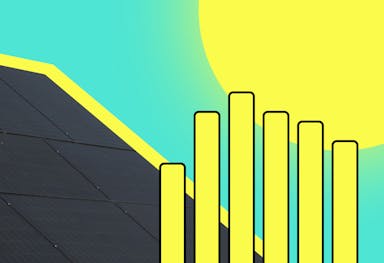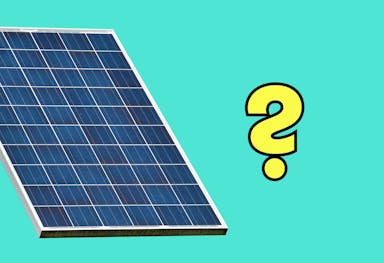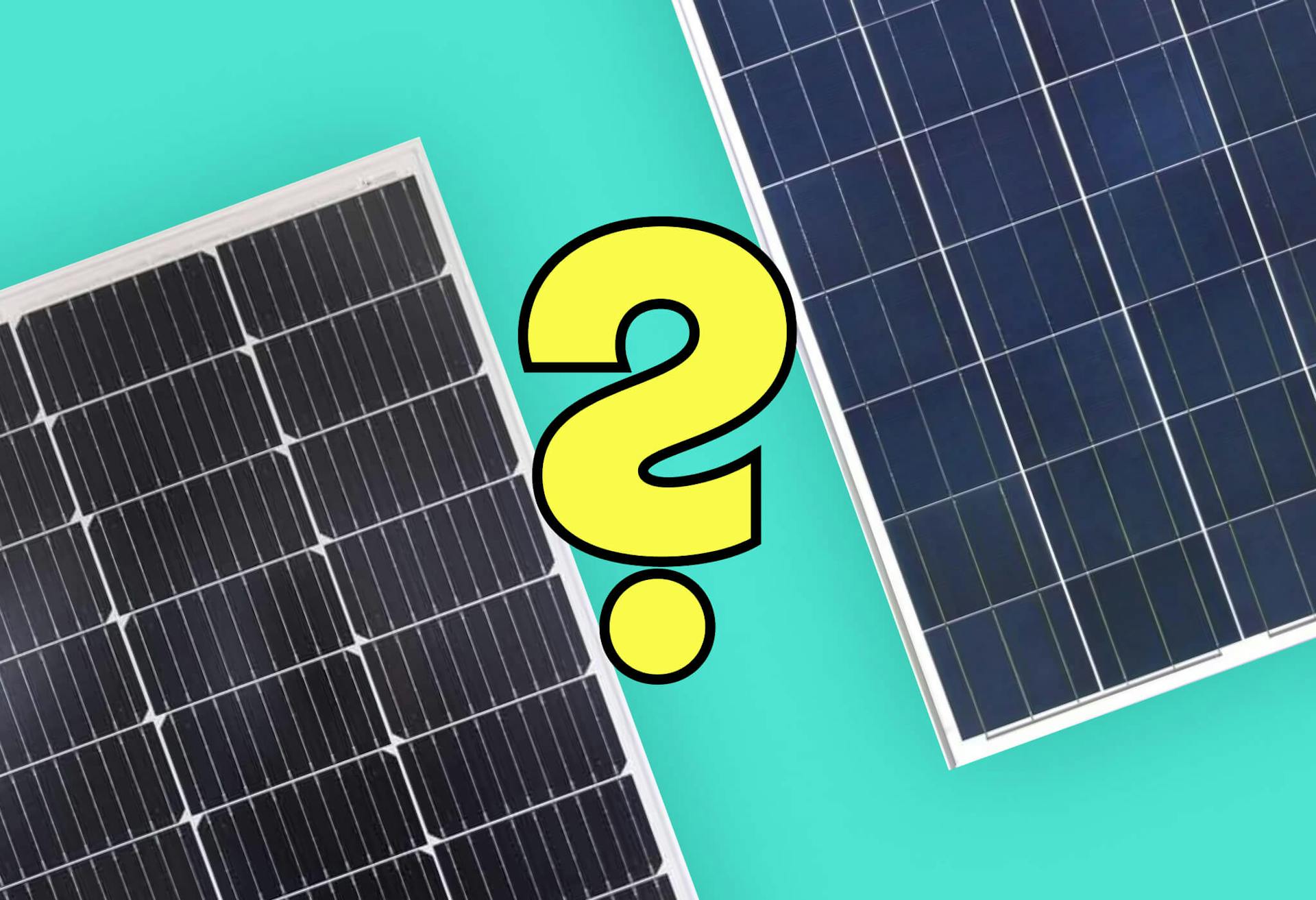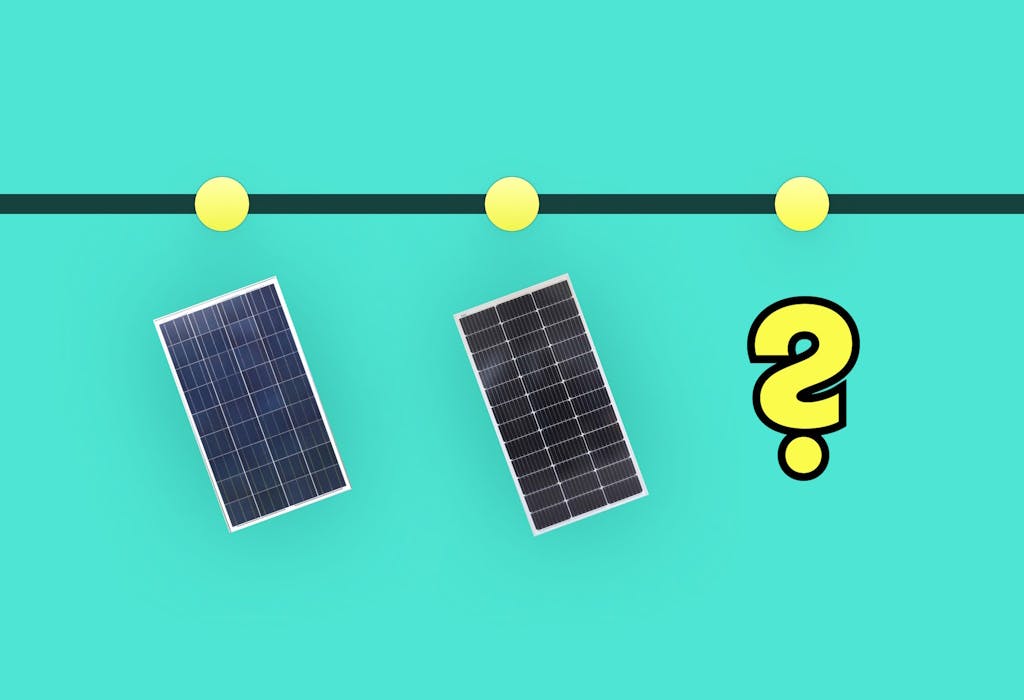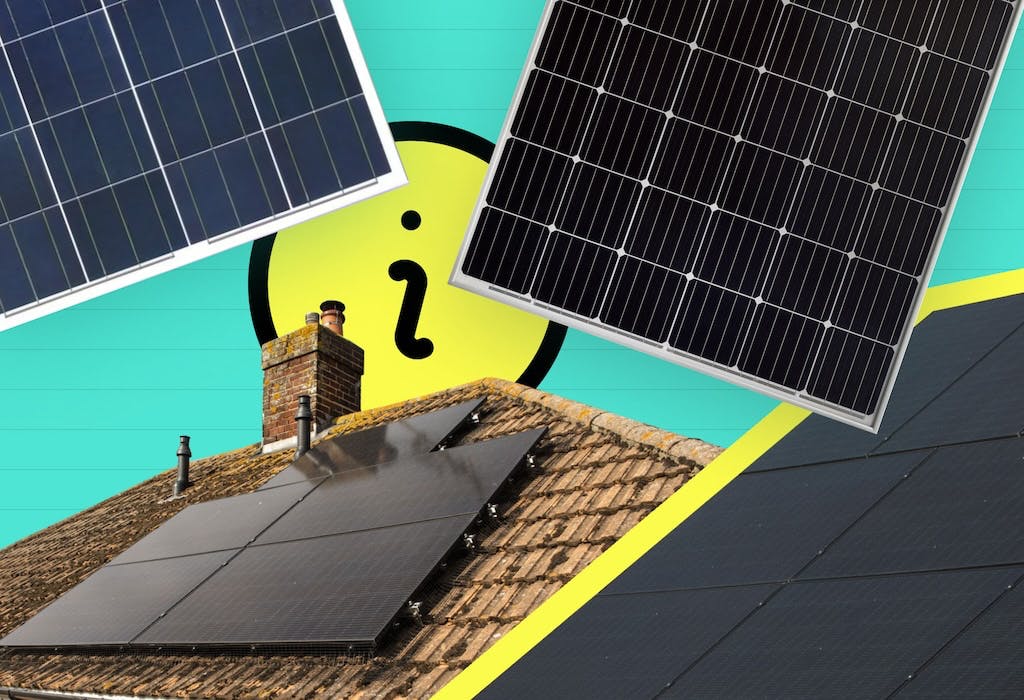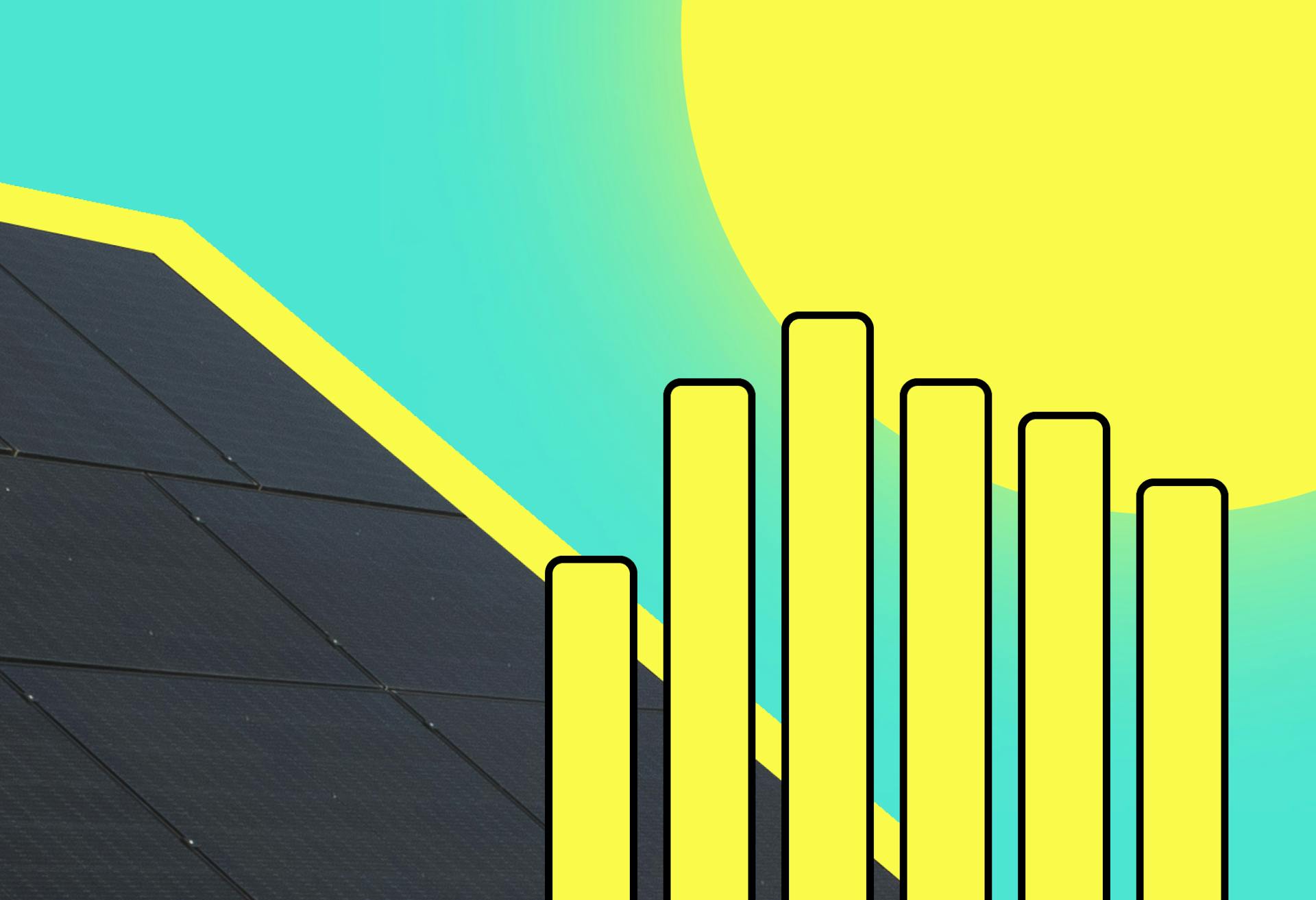- Solar advice hub
- Solar-technology
- Why are black solar panels better than blue?
Why are black solar panels better than blue?
Learn about the key differences between black solar panels and blue solar panels, including efficiency, lifespan, aesthetics and potential energy bill savings.


Why you can trust our content
We know that the solar industry is full of misinformation, but we only use reliable sources, including:
- Our experienced solar experts, installers and system designers
- Our own database of solar & battery system designs
- Authoritative bodies like MCS and the UK government



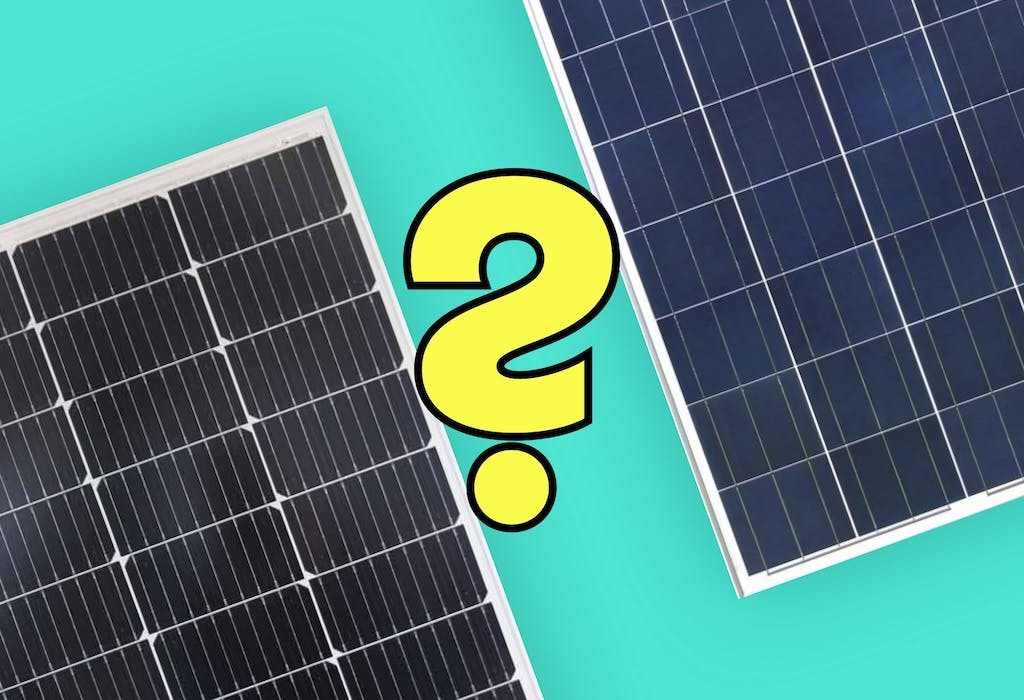
Calculate savings
What kind of home do you live in?
Calculate savings
What kind of home do you live in?
Black solar panels: at a glance
Over the past decade, black solar panels have taken over the market as the number one choice for homeowners who want both efficiency and style.
In this article, we'll explore why black solar panels outshine their blue counterparts - and why manufacturers have stopped producing the latter since 2023.
Interested in getting black monocrystalline solar panels with a battery? To find out how much you could save on your energy bills with solar, answer a few quick questions below and we’ll provide an estimate.
Find out how much you can save
What kind of home do you live in?
Why are solar panels black?
Modern solar panels are black because they're made from monocrystalline silicon. This material is composed of a single (hence “mono”) uniform crystal structure, which looks black to the human eye because of the way it absorbs light.
The panels also have an anti-reflective coating, typically made of silicon nitride or titanium dioxide. This coating enhances light absorption and reduces reflection, but also intensifies the deep colour of the panels.
Black solar panels are seen as more aesthetically pleasing than the older, blue solar panels. Their sleek, uniform look, combined with their superior performance (which we’ll explore below), has made black solar panels the preferred option for solar households across the UK.
What’s the difference between black and blue solar panels?
The most obvious difference between black and blue solar panels is, of course, their colour. However, this difference isn’t a deliberate design choice - it’s a natural result of the materials and manufacturing processes used to create them.
To produce monocrystalline silicon, manufacturers melt and slowly cool pure silicon to form a cylindrical silicon ingot, then slice the ingot into thin charcuterie-esque wafers to make uniform-looking solar cells.
Blue solar panels, on the other hand, are made from polycrystalline silicon, which is produced by melting lots of silicon fragments together in a mould.
As the melted silicon mixture cools, the resulting product is blue. This is because the multiple silicon crystals create grain boundaries that cause light to be scattered, before being absorbed.
Blue polycrystalline solar panels used to be a popular and cost-effective option, and most homes that switched to solar about 10 years ago will have blue solar panels.
However, a 2024 report from the National Renewable Energy Laboratory (NREL) shows that manufacturers completely stopped producing polycrystalline solar panels in 2023.
There are also new types of solar panels emerging, including perovskite solar panels and transparent solar panels.

Why are black solar panels better than blue?
Black solar panels outperform blue panels on multiple fronts, making them the clear choice for homeowners looking to cut their energy bills.
Here are five ways black solar panels outshine their blue counterparts:
- Higher efficiency
- Higher power output
- Better appearance
- Longer lifespan
- Better performance in hot weather
1. Higher efficiency
Black monocrystalline solar panels are much more efficient than polycrystalline, usually boasting rates of around 20-25%, according to our research. In contrast, recent IEA figures show that polycrystalline solar panels are only around 18-21% efficient.
This difference is crucial, because it means the panels can generate more electricity from the same amount of daylight and consequently provide even greater energy bill savings.
And with monthly energy bill savings, you will gradually recover the initial cost of the solar panels.
Since black panels are more efficient than blue panels, you need a smaller number of modules to generate the same amount of power - which makes them ideal for roofs with limited space. To learn more, check out our guide to how many solar panels you need.
And if you take a look at the most efficient solar panels on the market today, you won’t be surprised to see that they’re all monocrystalline.
Verified expertWhen comparing the efficiency of a monocrystalline solar panel and a polycrystalline solar panel, the difference is pretty stark. However, if you’re choosing between two monocrystalline panels with efficiencies that only differ very slightly, this is insignificant. If you get to this point, it’s much more important to focus on longevity, warranty, and appearance.
Alfie Ireland
Head of Operations & Technical at Sunsave
Alfie has worked in green tech for over a decade. During his four years at OVO, he helped develop the world’s largest domestic vehicle-to-grid trial.
2. Higher power output
Black solar panels are the top performers when it comes to power generation.
A solar panel’s power rating measures how much electricity it can generate under standard test conditions (STC). These conditions simulate sunlight by maintaining the panel at 25°C, exposing it to a light source of 1,000 watts (W) per square metre, and creating an air mass of 1.5.
If a panel generates 400W under these conditions, for example, then that’s its power rating - which means it can produce 25% more electricity than a 300W panel under the same conditions.
The most advanced black solar panels on the market now boast power ratings exceeding 500W, with some models even surpassing 600W or 700W.
In contrast, blue panels rarely exceed 400W and have historically lagged about 20% behind black models in terms of power output, according to Wood Mackenzie.
We’ve ranked the most powerful solar panels, and unsurprisingly they’re all monocrystalline.
At Sunsave, we always install monocrystalline solar panels, to ensure our customers get the best energy bill savings possible from their system. To find out how much you could save with a solar & battery system, provide a few quick details below and we’ll provide an estimate.
Find out how much you can save
What kind of home do you live in?
3. Better appearance
Solar panel aesthetics have always had a major influence on how they’re perceived, as many people are naturally very conscious about the look of their home.
And because of their sleek appearance, black solar panels are usually seen as more desirable than blue ones. They’re much better at blending in with UK rooftops, whereas polycrystalline solar panels tend to stand out a lot more.
This can be particularly helpful if you live in a listed building or conservation area, and you need your system to be as subtle as possible.
The marked improvement in solar panel aesthetics over the past 10 or so years could be part of the reason why solar can now have such a positive impact on property value. For example, a 2024 Swansea University study found solar panels boost home value by 6.1% to 7.1% on average.
For more details on the above study along with several others, you can read all about how solar panels can enhance your home’s value.
4. Longer lifespan
Black monocrystalline panels are tough and can last between 30 and 40 years, which makes them significantly more durable than every other type of solar panel.
For comparison, polycrystalline solar panels and solar tiles generally last around 25 to 30 years, while thin-film panels often cap out at just 10 to 20 years. This extended lifespan makes black panels a more cost-effective and sustainable investment in the long run.
Interestingly, the solar industry may even be underestimating how long panels can last.
For example, a 3.46 kilowatt-peak (kWp) polycrystalline system installed at Germany’s Oldenburg University in 1976 is still operational today, producing over 3,000 kilowatt-hours of electricity annually - far exceeding modern expectations for superior systems.
5. Better performance in hot weather
Solar panels naturally experience a drop in efficiency as temperatures rise, but black panels are better equipped to handle hot conditions - and it’s all because of their superior ‘temperature coefficient’.
A solar panel’s temperature coefficient is a critical metric that measures how much its output decreases for every degree above 25°C.
For example, a top-tier black solar panel with a temperature coefficient of -0.3% will lose 0.3% of its output for every degree above 25°C.
In contrast, blue panels typically have a higher temperature coefficient, meaning their output declines more severely in the heat.
While the UK isn’t known for its scorching weather, this feature is more relevant to British homeowners than it might seem at first. Solar panels begin to lose efficiency once the temperature exceeds 25°C - but this refers to the panel’s temperature, not the surrounding air.
Solar panels can easily reach 25°C when the air temperature is as low as 5°C. So during a summer heatwave in the UK when temperatures climb into the high 20s or early 30s, panel temperatures can soar well beyond this threshold - up to around 40-50 degrees.
As UK heatwaves are become more frequent, a solar panel’s temperature coefficient will be increasingly worth considering.
To learn more, check out our guide to how solar panels perform in hot weather.
Are black solar panels more expensive than blue?
As mentioned earlier, blue polycrystalline panels are no longer in production, so the only way to purchase them today is second-hand.
While second-hand solar panels may be cheaper at first, we strongly advise against buying them because of the potential issues with efficiency, lifespan, and warranties - all of which could actually cost you more money in the long run.
Even when blue panels were still in production, black monocrystalline panels were a better deal despite the higher price tag because they lasted longer, looked better, and were more efficient - and that hasn't changed.
To learn more, check out our guide to solar panel costs.
Can you get all-black solar panels?
Yes, you can get all-black solar panels that offer a sleek, modern aesthetic.
These panels are also made from monocrystalline silicon and use the same production processes, but unlike traditional monocrystalline panels, they feature a black backsheet and a black frame. This gives them a uniform, all-black appearance.
Monocrystalline panels often have a white backsheet and silver frame, but this creates a grid-like look that has lost its appeal over time.
You can also find variations in design. Some panels have a black frame but a white backsheet, which still creates a visible grid pattern. Others have a black frame and black backsheet but may show the wiring over the cells (although this is barely noticeable from ground level).
While all-black solar panels are highly efficient and aesthetically pleasing, there is one notable downside: heat absorption.
Their darker design causes them to absorb more heat, meaning the panels warm up more than standard models. Since solar panels lose efficiency as they heat up, this can result in a slight reduction in performance.
Can you get solar panels in any other colours?
Solar panels aren't exclusively black or blue anymore - they come in lots of different colours.
Specialised manufacturers are spicing up panels with all sorts of shades and patterns, so they can stand out against or complement various environments.
While this gives the creatives among us more style choices, these panels are usually pricier and slightly less efficient than black panels. Lighter-coloured panels don’t work as well as darker ones, as they reflect (rather than absorb) more light.
Many companies, including Solarix, Peimar, Metsolar, and Soluxa already produce colourful solar panels. You can buy panels in various shades of brown, grey, green, and white, as well patterned options to make a statement.
Are black solar panels worth it?
Given that blue solar panels are no longer in production, black panels are the clear choice for anyone considering solar.
They’re far superior to blue polycrystalline panels in every way - offering higher efficiency, a longer lifespan, and a sleek, modern appearance that works well with most rooftops.
Black solar panels are more expensive upfront than blue ones, but you can avoid the high upfront cost of switching to solar and enjoy flexible payment options with Sunsave Plus.
Thinking about getting black solar panels? Find out how much a solar & battery system could save you on your energy bills by answering a few quick questions below.
Find out how much you can save
What kind of home do you live in?
Black solar panels: FAQs
Related articles

Written byMelody Abeni
Based in London, Melody is a specialist green technology writer who has been covering sustainability, climate action and ESG for the past five years, after gathering operational experience in green investing and financial services. She has written for various industry publications, including renewable technology advisor The Eco Experts, and she holds a Master’s degree in law from Birkbeck University.



